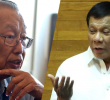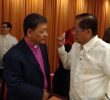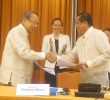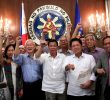
Negotiators of the government and the National Democratic Front of the Philippines meet in a panel to panel meeting on Sunday, April 2 in Radisson Blu Palace Hotel in Noordwijk, the Netherlands to discuss the agenda for the 4th round of the peace talks. The opening ceremony was moved to Monday, April 3. Top group: (L-R) GRP peace panel member Atty Antonio Arellano, GRP chief negotiator Silvestre Bello III, Presidential Peace Adviser Jesus Dureza, GRP peace panel member Hernani Braganza. Bottom (L-R) National Democratic Front of the Philippines Chief Political Consultant Jose Maria Sison and NDFP Senior Adviser Luis Jalandoni. (Zea Io Ming C. Capistrano/davaotoday.com)
NOORDWIJK, The Netherlands — President Rodrigo Duterte called his peace negotiators to give directives, hours before both panels from the government and the communist National Democratic Front of the Philippines postponed the supposed opening of the fourth round of peace negotiations here today.
Presidential Peace Adviser Jesus Dureza told reporters here Sunday that they got a telephone call from the President who visited soldiers who were wounded from clashes with the New People’s Army in Cagayan de Oro City.
Dureza said the President wanted the Parties to “quiet the guns and provide an enabling environment for the negotiations.”
“Alam mo ang pangulo gusto na habang nag-nenegotiate tayo eh we quiet the guns and provide an enabling environment for the negotiations. Mahirap kasi na tuloy tuloy nagnenegotiate tayo and then nagi-gyera tayo on the ground (You know the President wants to quiet the guns and provide an enabling environment for the negotiations while we are negotiating. It would be difficult to negotiate while armed encounters continue on the ground),” Dureza said.
The Philippine government earlier announced that it will not declare a ceasefire in time for the peace talks, a deviation from its pronouncement three weeks ago to cease military offensives.
“Alam naman natin si Pangulong Duterte is with us every step of the way so we have to get that final guidance from him before we formally enter to the formal opening,” he said.
Opening ceremonies postponed
The opening ceremony was moved to Monday morning, April 3, as the Parties continued to hammer out the agenda for this round of talks.
Speaking before the Filipino migrant workers who wanted to join the opening of the fourth round of talks at the Radisson Blu Palace Hotel here on Sunday morning, government chief negotiator Silvestre Bello III said the government panel needed to discuss the instructions from President Duterte with their counterparts from the NDFP.
“Konting tiis lang ha, nadelay lang tayo ng konti,” Bello told the crowd who are mostly members of militant migrant’s group, Migrante in Netherlands.
The opening ceremony was earlier slated to be held at around 1pm or 2pm Netherlands time April 2.
NDFP peace panel chairperson Fidel Agcaoili apologized to the OFWs.
“Some things happened that we did not expect. Those who came over to attend the ceremony today, even taking a bus, sorry,” he said.
‘Not this round’
Dureza said they will take up the issue of a “workable” bilateral ceasefire agreement across the table.
He said several incidents happened on the ground as the fourth round of talks was approaching.
“It’s a very important item and I think we will measure the success or the non-success of this round depending on the outcomes on the issue of the bilateral ceasefire,” he said.
NDFP Senior Adviser Luis Jalandoni, however, said there is a possibility to have a bilateral ceasefire agreement “perhaps not immediately here in the next few days.”
“Maybe on the next round,” he told reporters.
“May posibilidad na yung unilateral ceasefires of each side ay pwede gawin sa Joint Statement para magkaisa in preparation for the bilateral, pero baka mahirapan pa in the next five days bago magawa yung bilateral pero pagsisikapan ng magkabilang panig (There is a possibility that the unilateral ceasefire of each side is included in the Joint Statement in preparation for the bilateral, but it would be difficult in the next five days before we can hammer out a bilateral ceasefire agreement. But both Parties will make an effort),” Jalandoni said.
He said among the contentious issues of the bilateral ceasefire are the buffer zones that were proposed to be 8-kilometer each side.
The Parties will also determine the areas of each forces and the role of the monitoring committee.
The definition of what constitutes hostile actions will also be discussed.
No rush
Jalandoni said these issues should not be rushed.
“Hindi pwedeng i-rush pero pwedeng masinsinang pag-uusapan (We should not rush it, we can talk about it seriously),” he said.
Jalandoni also affirmed that both sides have the will to continue the talks to resolve the root cause of the armed conflict.
The more substantive agenda up for discussion is the Comprehensive Agreement on Social and Economic Reform, dubbed the “heart and soul” of the peace process.
Both Parties will also be discussing about the political and constitutional reforms.
Dureza said they are looking at about “a year of meetings” on the issue on CASER, but noted that the Parties have reached milestones early on. (davaotoday.com)









